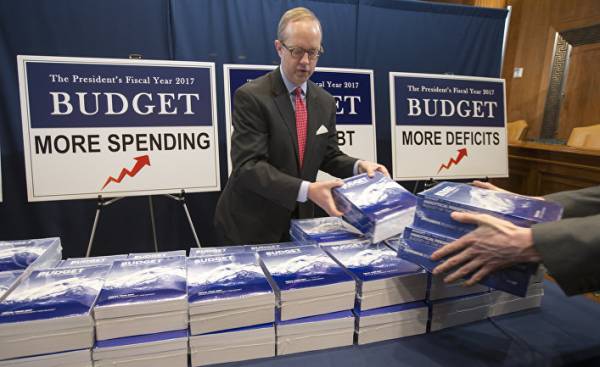
In the first official document of Donald trump on the budget made significant changes to one third in Federal spending associated with discretionary programs. Programme of measures to mitigate the effects of climate change are reduced or removed in all departments. Programs assisting the poor were reduced. And while almost every Department expect extensive spending cuts, three of them, the budget will increase substantially: the Ministry of defence, Ministry of internal security and the Ministry of veterans Affairs.
Reduction and increase the budget outlined in the document will have broad implications. Trump intends to Finance the construction of a wall on the border, raids, deportation, increased border patrol staff and the Bureau to ensure compliance with immigration and customs regulations, the purchase of new F-35 fighter and a number of warships. It is also extremely difficult to enforce legislation on environmental protection and labor laws, will lead to the end of subsidy programs and lending associated with environmentally friendly energy sources and vulnerable regions as well as significantly reduce funding for research in the field of biology and medicine.
The document is a “lean” budget, not including taxes and benefits social insurance, Medicare, Medicaid, and food stamps. It only specifies the change in “discretionary” spending departments. Overall, this represents about one third of the Federal budget; pobrania discretionary spending is about 16%.
The budget will not be adopted in full and its provisions are already causing a reciprocal reaction in Congress. It depends on the actual adoption of the Addendum to the policy spending; a trump can only make suggestions. But the document is in any case significant and important. He’s clearly talking about the priorities of the administration expenses of the departments, that she would support any decision of the Congress on the reduction of international environmental programmes as well as programmes to combat poverty.
Even in the present incomplete form, however, it is clear that the amendments will have large-scale consequences:
— 639 billion dollars allocated to all defence expenditure, including the base budget and operations abroad (military budget) — an increase of $ 52 billion;
— 7% and 6% respectively increased the budget of the Ministry of internal security and the Bureau of veterans Affairs. This includes funding for the construction of a wall on the border, another 1.5 billion dollars will be allocated for the deportation of immigrants without documents, 314 million dollars for the recruitment of border patrol and the Bureau to ensure compliance with immigration and customs regulations; a decrease of 667 million dollars in grants to States and local governments, including grants of Federal Agency for emergencies;
— 31% reduced the budget of the Agency for the protection of the environment, from 8.2 billion dollars to 5.7 billion dollars, the lowest level (when adjusted for inflation) for 40 years, he is even lower than what was expected by the Republicans in Congress. More than 50 programs will be closed, and with them will disappear and 3,200 jobs. In particular, the budget “closes a financing Plan for clean energy, international programs on climate change, programs, research and partnership in climate change and their associated actions” and reduces funding for the “Superfund” for cleaning hazardous waste;
— 28% will be reduced the budget of the state Department, particularly strong reductions are expected the United States Agency for international development. It is expected that the Initiative on global climate change and climate change programmes of the United Nations. Funding will be reduced by the UN, including peacekeeping program. Funding development banks, e.g. the world Bank, will be reduced by $ 650 million over three years;
significant reductions are envisaged for almost all other departments, including 21% in agriculture and labor, 18% — in the sphere of health care and social assistance, 16% in trade, 14% in education, 13% — in the sphere of housing and urban construction, 13% in transport and 12% in the Ministry of internal Affairs. The Ministry of education will receive $ 1.4 billion in new school program of their choice, and also to guarantee to private schools. This will cut funding for preschool, summer and after-school programs teacher professional development at a cost of $ 2.4 billion and grants need aid for College education;
huge reductions are expected in the costs associated with medical and scientific research, including 6 billion or 18 percent will be reduced the budget of the national institutes of health, $ 900 million — the budget of the office of scientific research Department of energy, $ 250 million, reduced subsidies for research and education in the National oceanic and atmospheric. There is also the abolition of the Agency for advanced studies in the field of energy;
— complete dismantling of the National endowment for the arts, National endowment for the Humanities, Corporation for public broadcasting, the legal services Corporation, U.S. Institute of peace and 14 departments.
The budget includes massive cuts to programs climate change
Among other things, the budget is aimed at the complete abolition of government obligations by the Obama administration to combat climate change. Antagonism to the programs of climate change begins with the office for the protection of the environment, where reduced funding for the Obama Plan for clean energy research in the field of climate change, international programs in the field of climate change, etc. But not the only one.
The purpose of the cuts in the state Department is the completion of the Initiative on global climate change and other international programmes in this field. The reduction in the Ministry of trade include a significant reduction in the budget of the National oceanic and atmospheric, one of the largest agencies conducting research in the field of climate change. The budget includes relatively small reductions in funding for NASA programs for the exploration of the Earth.
The draft budget abolishes funding for the program grants in the Ministry of transport, the majority of the funding which was spent on “rail, transit and Bicycle projects to reduce carbon emissions and solve the transport difficulties”, according to Michael Grunwald (Michael Grunwald) of Politico. In the budget of the Ministry of energy also abolished two programs that provide loans to companies working on clean energy and clean transport. The same goes for ARPA-Energy, the Agency, established under the law on stimulate the economy in 2009, providing funding for research in clean energy and building, often overlooked by venture capital.
The budget document is literally called “First America”, so it is perhaps not so surprising, what is particularly significant reductions were subjected to the international program. The abolition of the subject programs on cultural and educational exchange of the Department of state, in addition to the Fulbright program. The U.S. commitment to international organizations, from the UN to the world Bank, will be reduced. Even the order of military assistance abroad will be changed from subsidy to credit as a measure to reduce costs.
But the reduction extends beyond the state Department and the Agency for international development. The Ministry of agriculture, for example, abolished the international food education program McGovern-Dole, which aims to fight hunger in the world in 2016 in the framework of food received more than 2 million people, in 2008, its authors, former U.S. Senator, received the world food prize.
The National institutes of health abolished the only unit in the field of global health. The Ministry of labour will be abolished subsidy program Bureau of international labor relations.
In the state Department and the Agency for the development of international relations will be stored Fulbright program, with other programs of cultural and educational exchange will be reduced. The budget States that “it provides sufficient resources to maintain existing commitments and the level of patients” in the framework of the Federal government to fight HIV/AIDS PEPFAR, “preserves funding for programs to combat malaria,” and “complies with the U.S. commitments to the global Fund to fight AIDS, tuberculosis and malaria.” It also States that it “revised the procedure for the provision of economic aid and assistance in the development of countries that have great strategic importance for US.”
In other words, while funding for global health can be allocated to areas in need of more participation, and other assistance for development will be redirected: instead of needy countries, it will be to countries that are strategically important for the United States. Now, however, funding is allocated rather on the basis of geopolitical interests than on humanitarian need.
The abolition of discretionary programs for the poor
Most of the core programs to support the poor is a mandatory spending programs, that is, they are not part of the “thin” budget trump: Medicaid, supplemental nutrition assistance Program SNAP/food stamps, tax credit for earned income, supplementary income, social security and other programs that help Americans with low incomes.
But even given these limitations, in the draft budget trump every effort is made to reduce the cost of the fight against poverty. Funding for the supplementary feeding programme for women, infants and children (WIC), in which direct supply of infant formula, healthy food, tips on nutrition and provides other assistance to low-income mothers with young children, will be reduced from 6.4 to 6.2 billion dollars.
The legal services Corporation that provides funding for organizations offering legal support to the poor in civil matters (claims against the tenant in cases of unlawful eviction or against the chief in case of illegal termination of the contract) will be completely eliminated. Program one-time subsidies for urban development, and related local and state governments in the implementation of the programme “Meals on wheels” (Meals on Wheels), infrastructure development, etc. will be completely eliminated.
The same thing will happen with the program Choice Neighbourhood, aimed at restoring neighborhoods in poor areas, and HOME Investment Partnerships, a program of lump-sum subsidies to regional and local authorities for the costs of implementing affordable housing programs. There will be no programme of assistance to the poor payment of energy (LIHEAP) and the Federal program to provide additional opportunities for education that provides financial assistance to low-income College students.
These reductions are not as large as required, which may be taken in may or those included in the present bill on health care. But they could appear only as the result of careful consideration of the discretionary budget for any programs aimed at assisting the poor to further the abolition of each of them.







